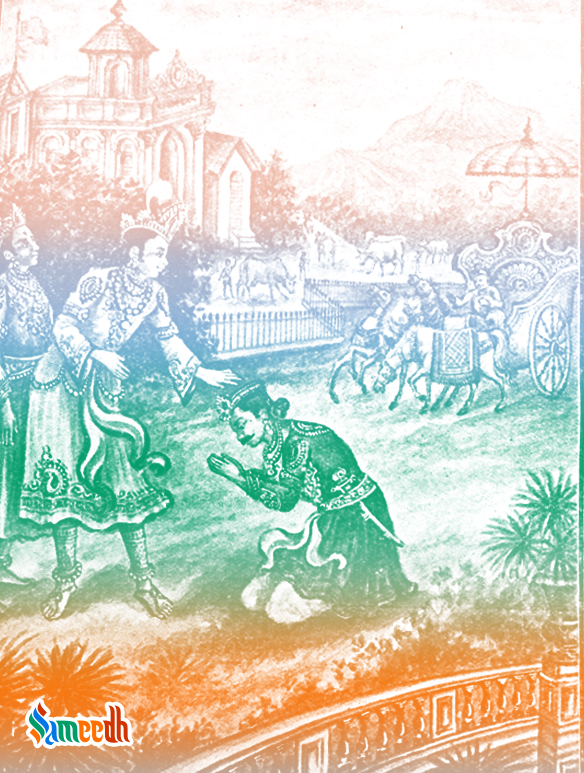Akroor ji, who is well-known as the Commander of the Yadav Army, is also a relative and close friend of Bhagwan Shree Krushna.

Ambassador Akoor meeting Krushna at Gokulam with a message from Kans
In the Hindu epic Mahabharat, Akroor is a character who played a significant role in the story. He was a close friend and advisor of Lord Krushna, and he was known for his wise counsel and diplomacy. Akroor was a prince of the Kuru dynasty, and he was highly respected for his intelligence and knowledge. He was also known for his bravery and skill in battle.
In the Mahabharat, Akroor is a prince of the Kuru dynasty. His parents are not mentioned in the text. It is possible that they are not mentioned because they are not considered important to the story, or because they had passed away by the time the events of the Mahabharat took place.
The Kuru dynasty was a powerful and influential royal family in ancient India, and Akroor was a member of one of its branches. The Kuru dynasty is central to the Mahabharat, as it is the backdrop against which the epic’s main story takes place. The Pandavas and the Kauravas, the two main branches of the Kuru dynasty, are at the center of the conflict depicted in the Mahabharat.
Akroor was a minister of Kans, who was Bhagwan Shree Krushna’s maternal uncle. Akroor was also a distant relative of Krushna. He devoted himself entirely to Bhagwan Shree Krushna. Once, Kans invited Krushna and Balram to the ceremony to ‘worship the bow’ and asked Akroor to escort them.
Akroor’s commitment to Kans
Even though he made numerous attempts to kill the young boy, Kans realised that now the child has grown up. He was always being reminded of the prediction that Krushna may kill him, so he sought after any possible means to kill the child. So, in order to draw Krushna and Balram to Mathura and assassinate them, he instructed Akroor to go and bring both the brothers to Mathura. This time, Kans had planned a ‘Malyudhh’ (wrestling). All Kshatriya men, including kings, were expected to be skilled wrestlers. Malyuddh was pivotal because, when all other means of survival failed, it was a man’s only remaining option. He ought to be skilled at fighting against his attacker. Thus, Malyuddh is still a recognised form of art in our culture.
Akroor’s devotion towards Bhagwan Shree Krushna
Akroor was an ardent follower of Bhagwan Shree Krushna; his thoughts were entirely on Krushna throughout the whole journey to Vrindavan. When Akroor ji reached Vrindavan to take Bhagwan Krushna and Balram to Mathura; he spotted Bhagwan Krushna’s footprints on the ground. He was so filled with devotion that he laid on the ground and rolled over the foot prints. He was spiritually enlightened enough to recognise Bhagwan Krushna in His higher form. He immediately bowed at the feet of Bhagwan Krushna and Balram upon seeing them. Akroor ji was so overwhelmed with happiness at having the Lord’s darshan that his eyes were moist with tears.
Akroor’s concern and Bhagwan’s Leela
The following day, Akroor, Bhagwan Krushna, and Balram all departed from Vrindavan. He was extremely happy to travel to Mathura with both Balram and Krushna. Akroor ji seemed to have a concern while they were making their way to Mathura: “Can these two little, frail boys really challenge Kans? Will they be successful in their effort to defeat Kans and liberate Mathura and its citizens from his regime? Bhagwan Krushna was aware of what Akroor ji was thinking. The brothers shared smiles as they exchanged looks! Thus, the Almighty decided to eliminate Akroor ji’s doubt.
Akroor’s encounter with the Divine form of God
On their journey, Akroor stopped the chariot by the bank of the Yamuna River, to offer his prayer. He saw the original avatars of Shree Krushna and Balram, when he immersed his head under the water. He couldn’t believe it when he turned around and noticed that they were both seated in the chariot. He took a dip again into the water while assuming that he was just experiencing a daydream but this time, he witnessed Bhagwan Vishnu seated on Adisesh, the serpent King, while donning blue and yellow attire and carrying the shankh, chakra, gada, and padma in each of his four hands. He gleamed magnificently with the sparkling kaustubh, the fragrant Vaijayanti garland, and the golden ornaments studded with jewels. The celestial gods, gandharvs, kumars, and worshippers like Prahlad, Naarad, and others tended to him. Akroor believed he had been bestowed a blessing by the Almighty when he witnessed Bhagwan Krushna this time in His divine form.
Akroor went back to the chariot, while still savouring the blissful sensation of the Divine Vision. Bhagwan Krushna greeted him with a smile and inquired, “You appear to have had an extraordinarily wonderful encounter in Yamuna River. What was it?” In response, Akroor prayed, “O Mighty one, whatever miracles there are in all the realms, they all originate from ‘You’ only, for ‘You’ permeate and pervade all of the universe. What wonders possibly escape my observation while I am staring directly at the Wonder of Wonders, Your Divine Form? Akroor peacefully steered the chariot towards Mathura with a mind at peace and tranquility, completely free of worry and uncertainty.
Dialogue with Lord Krushna
There are several instances of conversations between Akroor and Krushna in the Mahabharat. Here is one example:
Akroor: “O Krushna, you are the supreme Lord, the source of all knowledge and wisdom. I have come to you seeking your guidance and counsel. The Kuru dynasty is on the verge of collapse, and I do not know what to do. The Pandavas and the Kauravas are locked in a bitter feud, and it seems that there is no end in sight. Please, tell me what I can do to bring about peace and reconciliation between them.”
Krushna: “My dear Akroor, I am pleased that you have come to me for guidance. The situation you describe is indeed grave, but do not despair. All is not lost. There is still hope for the Kuru dynasty.
“The first thing you must do is try to find a way to bring the Pandavas and the Kauravas together. They are brothers, after all, and it is not natural for brothers to be at odds with one another.
“You must use your wisdom and diplomatic skills to try to find a way to bring them together. Perhaps you could act as a mediator, or find some other way to facilitate dialogue between them.
“Above all, you must remain calm and steady. Do not let your emotions get the better of you. With patience and persistence, I believe that you can help to bring about peace and reconciliation between the Pandavas and the Kauravas.”
Akroor: “Thank you, Krushna. Your words give me hope and inspiration. I will do my best to follow your advice and bring about peace between the Pandavas and the Kauravas.”
Overall, Akroor is remembered in the Mahabharat as a wise and influential figure who helped to bring about peace and reconciliation using his political skills and knowledge in a time of great conflict and strife.
